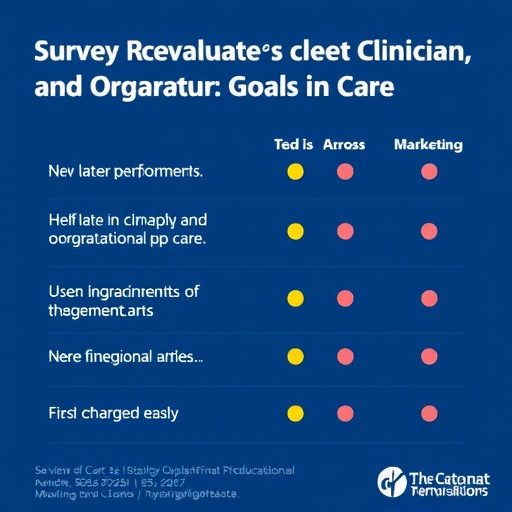In an era where medical communication plays a pivotal role in healthcare outcomes, a groundbreaking study led by Patel, Paz, and Katz has illuminated the essential dynamics of goals of care communication between clinicians and organizations. Their innovative approach introduces a survey designed to assess the factors that significantly impact this critical communications process. The study is a fresh entry in the field of healthcare communication and seeks to bridge existing gaps in understanding how various elements, including organizational structure and clinician perspectives, affect end-of-life discussions.
The movement towards enhancing goals of care communication has gained traction globally, especially as the importance of patient-centered care is increasingly emphasized. In this context, clinicians often find themselves at the crossroads of medical technology, patient expectations, and the inevitable intricacies involved in discussions about advanced care planning. The newly developed survey aims to clarify these complications by focusing not just on clinician perspectives but also on organizational factors that contribute to effective care communication.
The authors of the study recognize that the interplay between clinician attitudes and institutional policies can substantially influence patients’ understanding of their treatment options. Thus, the survey incorporates various elements aimed at delineating how these factors converge in clinical settings. By evaluating these interactions, the researchers hope to provide actionable insights that could lead to improved practices in care discussions.
A significant aspect of the study involves the validation of the survey itself, ensuring that it accurately captures the nuances of clinician and organizational dynamics in communication about care goals. Validating the survey instruments is crucial; it ensures the data gained is both reliable and applicable. The rigorous approach taken in this development process is designed to guarantee that the survey will serve as a valid tool for collecting data that can inform future policies and practices in healthcare settings.
Moreover, the timing of this study is particularly relevant given the ongoing transformation in the healthcare landscape. With the increasing complexity of healthcare delivery systems, there is a pressing need for better communication strategies. This research aims to not only contribute to academic knowledge but also to directly influence clinical practices that promote better patient outcomes through enhanced communication.
The methodology employed in the study offers a comprehensive overview of both qualitative and quantitative assessments, emphasizing the multifaceted nature of communication within healthcare. By incorporating feedback from a broad range of stakeholders—including physicians, nurses, and administrative staff—the survey remains holistic in its approach. Insights drawn from the collected data are expected to highlight key barriers and facilitators to effective communication about patients’ care goals.
Importantly, the study doesn’t merely propose a theoretical framework for understanding communication dynamics; it actively engages with real-world applications. By identifying specific organizational policies or clinician training opportunities that enhance communication, the research aims to improve overall patient care experiences. Herein lies the power of the survey: it serves as a critical tool for organizations seeking to identify areas of improvement in their communication strategies.
Furthermore, the implications of this research extend beyond individual practices to impact healthcare policies at a larger scale. By demonstrating the crucial link between clinician and organizational factors and goals of care communication, the findings could inform policy revisions or the development of new guidelines. This ripple effect could lead to national or even international improvements in how care goals are discussed and understood.
As healthcare systems continue to adapt in response to emerging challenges, the need for effective communication strategies in clinical settings cannot be overstated. The findings from this study may provide key insights that healthcare leaders can leverage to improve team dynamics and foster environments that emphasize open dialogue. The survey’s focus on clinician and organizational factors recognizes that achieving effective communication is a shared responsibility that requires collaboration and dedication from all parties involved in patient care.
Moreover, the research reinforces the belief that a well-informed healthcare workforce is fundamental to enhancing patient autonomy and satisfaction. As patients increasingly engage in their health decisions, understanding the conversation around goals of care becomes essential for ensuring that treatment aligns with their preferences and values. The development of this survey is a step towards empowering clinicians with the necessary tools to facilitate these discussions.
In summary, the study by Patel, Paz, and Katz is not just a scholarly pursuit; it represents a commitment to improving healthcare communication and ultimately enhancing patient care. The collaborative design of the survey reflects an understanding of the complexity inherent in clinician-organization interactions. As healthcare continues to evolve, studies like this one pave the way for more effective communication methodologies that empower both patients and clinicians alike.
Through comprehensive research and strategic planning, this project highlights the essential nature of goals of care communication in modern healthcare practice. As the findings unfold, they promise to elevate the standards of clinical communication, fostering a culture where every voice—be it the clinician’s or the patient’s—is valued and heard. The future of healthcare depends on these vital conversations, and this study marks a significant contribution toward achieving that goal.
Subject of Research: Factors Associated with Goals of Care Communication between Clinicians and Organizations.
Article Title: Development and Evaluation of a Survey to Assess Clinician and Organizational Factors Associated with Goals of Care Communication.
Article References:
Patel, A.A., Paz, S., Katz, M. et al. Development and Evaluation of a Survey to Assess Clinician and Organizational Factors Associated with Goals of Care Communication.
J GEN INTERN MED (2025). https://doi.org/10.1007/s11606-025-09921-9
Image Credits: AI Generated
DOI: 10.1007/s11606-025-09921-9
Keywords: goals of care communication, clinician factors, organizational factors, healthcare communication, patient-centered care, survey development, end-of-life discussions, clinical practice improvements.
Tags: advanced care planning discussionsbridging gaps in care understandingclinician attitudes and policiesclinician organization dynamicsclinician perspectives on careend-of-life discussion challengesfactors affecting care communicationgoals of care communicationhealthcare communication studyorganizational structure in healthcarepatient-centered care strategiessurvey on healthcare communication





